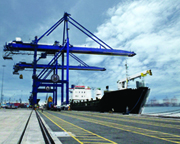
PHILIPPINE shipping lines and other industry stakeholders are asking the Philippine Ports Authority (PPA) and the National Economic and Development Authority (NEDA) how they came up with what they claim are “high” cranage rates for the Manila North Harbor.
Last Dec. 27, PPA issued Memorandum Circular 15-2013 allowing North Port operator Manila North Harbour Port, Inc. (MNHPI) to charge domestic cranage rates pursuant to Board Resolution No. 2336. The rates take effect on Jan 28, 2014.
In a letter to PPA general manager Juan C. Sta. Ana obtained by PortCalls, Philippine Liner Shipping Association (PLSA) chairman and president SulficioTagud said the association had “received inquiries and objection” to the rates from its shippers and clients through the Supply Chain Management Association of the Philippines (SCMAP) and other concerned parties.
The group asked the PPA to “shed light as to how the rates were computed, including the comparative analysis of rates” done by the hearing panel that consisted of other government agencies such as the NEDA and the Department of Trade and Industry.
The PPA set the cranage rate for 20-foot containers and below at P1,288 per loaded box and P1,083 for empties. For containers larger than 20-footers, the fees will be P1,802 per loaded box and P1,396 for an empty. The rates, however, are noticeably lower than what MNHPI had proposed.
PLSA is also asking why PPA MC 15-2013 was neither signed by the PPA general manager nor the assistant general manager. The order was signed by PPA assistant general manager for engineering Atty. Tomas Carlos as officer in charge.
The association said given the possible effects on the consuming public as a whole, the memo should have been signed and approved by “someone directly involved in evaluating and analyzing the MNHPI petition.”
As one of the affected parties, PLSA said it is at a loss on “how to deal with the rise in cargo handling rates”, noting that shipping lines have not been “financially robust despite the alleged increase in trade/volume.”
In a separate letter to Socio-Economic and Planning Secretary and NEDA chief Arsenio Balisacan, PLSA cited Cabinet Resolution No. 01-2007, which requires the NEDA Board approval of all new fees and increase in fees imposed by all government departments, bureaus, commissions, agencies and offices’ and corporations.
100% increase
“Our shippers/clients and other concerned parties find the cranage rates high as (they) will add up to the cost of handling containers, both laden and empty at the Manila North Harbor port. Existing cargo handling (CH) rates, without the cranage fee under MC 15-2013, are composed of arrastre and stevedoring only. With the adoption of the domestic cranage rates, CH rates in the Manila North Harbor shall then be composed of cranage, arrastre and stevedoring which will tremendousely increase CH by more than one hundred percent…,” PLSA’s Tagud pointed out in the letter to Balisacan.
With the cranage rates, cargo handling rates at the North Port will increase by 197% for laden 20-foot containers and 177% for 40-footers, PLSA said. Adding the cranage to the P1,328.50 in stevedoring and arrastre fees, a 20-footer will be charged a total of P2,616.60.
For 40-footers, P4,131 will be charged, compared with the existing P2,329.
For empty boxes, a 20-footer will be charged P1,809.50, a 249% increase from the former P726.50, while 40-footers will be charged P2,524.50, up 223% from the existing P1,128.50.
“Inasmuch as the adoption of the cranage rates would redound to an increase in the shipping lines’ operational costs, we felt that, as partners of government in transport and logistics, we should be informed as to how the rates were computed. Since NEDA is the appropriate govenment agency to determine the reasonableness of any new rate or adjustment, we seek advice… as regards the recommendation based on a NEDA analysis/study done in determining the cranage rates,” Tagud said.
A source from the domestic liner industry told PortCalls in a text message that “the cost will be passed on to our customers and ultimately to the consumers,” echoing what PLSA said in its letter.
The source added it is the current practice with arrastre charges, which is why customers “have a stake in evaluating how the rates were arrived at.” –– Roumina M. Pablo




